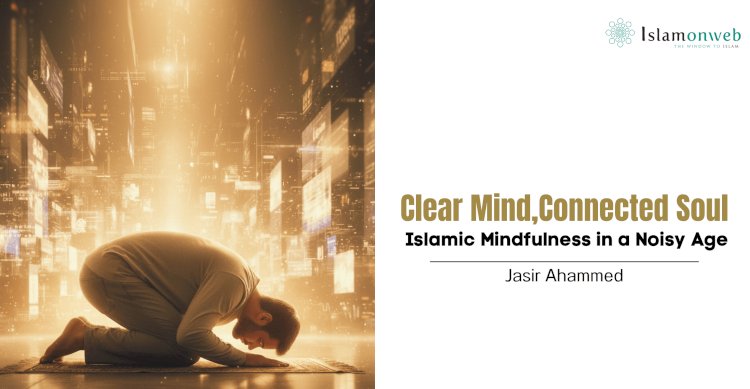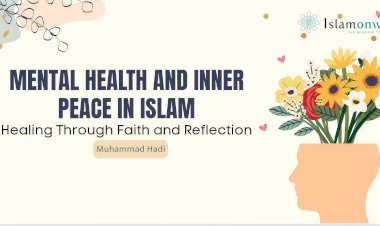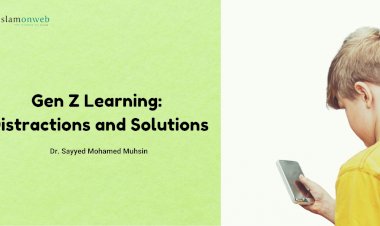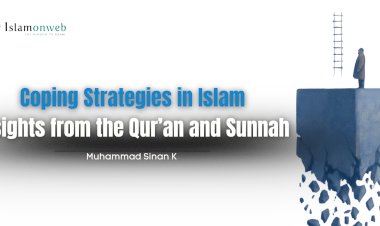Clear Mind, Connected Soul: Islamic Mindfulness in a Noisy Age
The modern world is filled with distractions, leading to mental fatigue, anxiety, and emotional dysregulation. This spiritual crisis is reflected in the struggle between worldly distractions and spiritual tranquility, particularly among modern Muslims seeking clarity and divine intimacy.
The Qur’an speaks directly to this condition when it says:
لَهُمْ قُلُوبٌۭ لَّا يَفْقَهُونَ بِهَا وَلَهُمْ أَعْيُنٌۭ لَّا يُبْصِرُونَ بِهَا وَلَهُمْ ءَاذَانٌۭ لَّا يَسْمَعُونَ بِهَآ ۚ أُو۟لَـٰٓئِكَ كَٱلْأَنْعَـٰمِ بَلْ هُمْ أَضَلُّ ۚ أُو۟لَـٰٓئِكَ هُمُ ٱلْغَـٰفِلُونَ
"They have hearts with which they do not understand, eyes with which they do not see, and ears with which they do not hear. They are like cattle—no, they are even more astray. They are the heedless ones."
(Surah Al-A‘rāf 7:179)
The verse highlights the spiritual aspect of perception, highlighting ghaflah (heedlessness) as a hindrance to higher awareness. Islam offers muraqabah, a deep inner attentiveness practice, rooted in the Qur'an and lived by Prophet Muhammad ﷺ and his companions. Muraqabah involves vigilant mindfulness of Allah's presence in all states, visible and invisible, and the awareness that God observes us and is always with us:
"وَهُوَ مَعَكُمْ أَيْنَ مَا كُنتُمْ "
“And He is with you wherever you are."
(Surah Al-Ḥadīd 57:4)
Islamic mindfulness is an ontological practice that focuses on Muslims' relationship with Allah, fostering conscious witnessing, purification, and tranquility. This deeply indigenous spiritual discipline offers Muslims a way to resist chaos and anchor themselves in divine presence, presenting muraqabah as an urgent prescription.
Mindfulness in Contemporary and Islamic Thought: A Comparative Exploration
In the digital age, mindfulness has become a psychological response for Muslims, offering focus and calmness. In Islamic thought, muraqabah, a spiritual imperative, transcends wellness boundaries to connect with Allah. Both secular and Islamic mindfulness practices aim for self-mastery and divine proximity.
Mindfulness as a Secular Therapeutic Instrument
Jon Kabat-Zinn's 1970s Mindfulness-Based Stress Reduction program, adapted Buddhist meditative principles for clinical use, introduced secular mindfulness as a therapeutic tool, focusing on present-moment awareness without judgment. Kabat-Zinn's definition of mindfulness is now widely recognized that :
“Paying attention in a particular way: on purpose, in the present moment, and non-judgmentally.”
Secular mindfulness, a popular psychological and medical model, has been shown to reduce anxiety, depression, and chronic pain, improve cognitive function, and enhance emotional regulation. However, critics argue that secular mindfulness can become commodified, serving capitalism's demands rather than individual transformation. The focus of mindfulness often remains inward, focusing on self-referential approaches rather than metaphysical purpose.
Muraqabah: The Core of Islamic Mindfulness
Islamic spirituality offers a more comprehensive approach to mindfulness, rooted in the concept of muraqabah. This practice emphasizes a deeper, intimate consciousness centered on the Divine, rather than the self. Muraqabah is not just a practice but a state of spiritual vigilance, allowing for ethical restraint, emotional balance, and spiritual transformation within the realm of Allah's presence.
From Divine Awareness to Prophetic Presence
Linguistically, the term muraqabah (مراقبة) stems from the Arabic root ر-ق-ب (rā-qāf-bāʾ), meaning “to watch” or “to observe.” One of Allah’s Names in the Qur’an is Ar-Raqīb—The Watchful—indicating His omniscient and omnipresent nature. In the language of the soul, muraqabah signifies the believer’s inner awareness that they are constantly under the divine gaze, both outwardly and inwardly.The Qur’an reinforces this mode of consciousness with verses such as:
وَهُوَ مَعَكُمْ أَيْنَ مَا كُنتُمْ ۚ
"And He is with you wherever you are."
(Surah al-Ḥadīd 57:4)
وَلَقَدْ خَلَقْنَا ٱلْإِنسَـٰنَ وَنَعْلَمُ مَا تُوَسْوِسُ بِهِۦ نَفْسُهُۥ ۖ وَنَحْنُ أَقْرَبُ إِلَيْهِ مِنْ حَبْلِ ٱلْوَرِيدِ
"And We have already created man and know what his soul whispers to him, and We are closer to him than [his] jugular vein."
(Surah Qāf 50:16)
These verses in Muraqabah teach the heart to adopt a new existential posture, shifting the focus from personal equilibrium to divine attentiveness. It encourages constant awareness of Allah's presence in all actions, speech, and thought, ensuring nothing is hidden.This principle is articulated most profoundly in the Hadith of Jibrīl, where the Prophet Muhammad ﷺ defined ihsān as:
"That you worship Allah as though you see Him, and if you do not see Him, then [know that] He sees you."
This hadith becomes the spiritual blueprint for muraqabah: to strive toward living each moment in the shadow of divine observation. It is a journey from knowledge to presence, from presence to intimacy. The Prophet ﷺ modeled this in his demeanor—his thoughtful silences, his gentle speech, his balanced emotions, and his internal serenity.
Diagnosing Distraction: The Inner Chaos of the Modern Mind
In the modern era, distraction has become a permanent part of human consciousness, with constant notifications, advertisements, and social media updates disrupting our attention spans and limiting our ability for silence, reflection, and presence. This digital overload leads to fragmentation of the mind, heart disconnect, and a growing distance from our Source.
In the Qur’an, this state of inner disconnection is described with the word ghaflah—heedlessness. Allah warns:
“And do not be among the heedless.”
(Surah al-A‘rāf 7:205)
Ghaflah is not mere forgetfulness—it is the spiritual numbness that settles when one is constantly immersed in worldly distractions. Today, this heedlessness is not only normalized; it is institutionalized. It is repackaged as entertainment, multitasking, or efficiency, and it renders silence uncomfortable and presence rare. Diagnosing this inner chaos is essential to understanding why muraqabah—Islamic mindfulness—is more needed now than ever.
Noise, Numbness, and the Loss of Presence
The digital age has led to mental noise, unprocessed emotions, and internal chatter, affecting younger generations. This fragmentation weakens attention and emotional depth, resulting in continuous partial attention. This erodes productivity, moral clarity, and emotional well-being, and from a spiritual perspective, results in mechanical prayers, shallow dhikr, and rare reflection(thafakkur) .The Prophet Muhammad ﷺ spoke to this when he said:
أَلاَ وَإِنَّ فِي الْجَسَدِ مُضْغَةً إِذَا صَلَحَتْ صَلَحَ الْجَسَدُ كُلُّهُ وَإِذَا فَسَدَتْ فَسَدَ الْجَسَدُ كُلُّهُ أَلاَ وَهِيَ الْقَلْبُ
“Verily, in the body there is a piece of flesh—if it is sound, the whole body is sound; and if it is corrupted, the whole body is corrupted. Verily, it is the heart.”
Distraction can corrupt the heart, leading to loss of focus, sincerity, and spiritual intimacy. The Prophet's life provides a remedy by engaging in deep silence and contemplation in the cave of Ḥirā’ before revelation, and continuing this practice through night prayers (qiyām al-layl), long silences, and frequent seclusions after prophethood.
The Stages of Thought: Al-Suyūṭī’s Insight on Mindful Governance of the Soul
Imam al-Suyūṭī's classical science of internal cognition is a significant contribution to Islamic mindfulness. His model of thought progression offers a spiritual and psychological map of how fleeting ideas evolve into moral actions or sins. Rooted in Qur'anic ethics and Prophetic wisdom, this framework complements muraqabah, the practice of divine watchfulness. In an age of impulsivity and reactive behavior, al-Suyūṭī's stages of thought provide a sacred pause for ethical reflection and spiritual redirection.
A Sacred Sequence: The Five Stages of Thought
Al-Suyūṭī categorizes human thought into five levels, each with greater psychological depth and spiritual consequence, enabling believers to recognize their position in the chain and determine muraqabah intervention.
- al-Ḥājis (الخاطر الهَاجِس) – The Fleeting Thought
A spontaneous, momentary idea that enters the mind without volition. It holds no ethical weight and is not punishable or praiseworthy unless it is entertained or acted upon. - al-Khāṭir (الخاطر) – The Emerging Notion
The thought returns or lingers, beginning to attract conscious attention. Though still morally neutral, it now invites the soul to engage or dismiss it.
- Ḥadīth al-Nafs (حديث النفس) – Inner Dialogue
The thought transforms into internal conversation—debated, justified, fantasized, or feared. The heart inclines toward or away from its content. - al-Hamm (الهَمّ) – Emotional Inclination
The soul leans emotionally toward actualizing the thought. It now carries moral weight, though it remains reversible through intention and restraint. - al-ʿAzm (العَزْم) – Firm Resolve or Intention
At this stage, the idea solidifies into a decision. If the resolution is toward good, reward is written even before action. If toward sin, and unacted upon, it is forgiven—demonstrating divine mercy.
The Prophet ﷺ summarized this process in a foundational hadith:
إِنَّ اللَّهَ عَزَّ وَجَلَّ تَجَاوَزَ لأُمَّتِي مَا وَسْوَسَتْ بِهِ وَحَدَّثَتْ بِهِ أَنْفُسَهَا مَا لَمْ تَعْمَلْ أَوْ تَتَكَلَّمْ بِهِ
'Allah, the Mighty and Sublime, has forgiven my Ummah for what is whispered to them or what enters their minds, so long as they do not act upon it or speak of it.'
Thus, moral accountability begins not with thought itself, but with intention and resolve—a principle that balances psychological realism with ethical responsibility
Conclusion
Mindfulness is a crucial aspect of Islamic practice, promoting psychological resilience and ethical self-awareness. It aligns the human soul with the divine gaze, fostering spiritual vitality and a sense of moral purpose. Muslims, guided by the prophetic tradition, emphasize the connection between the interior and outer world, requiring reclaiming Islamic mindfulness to control attention, purify intentions, and elevate existence from reaction to worship.
About The Author
Jasir Ahammed is a degree scholar at Darul Huda Islamic University, specialising in the Department of ʿAqīdah and Philosophy.
References
- Al-Qur’ān al-Karīm
- Al-Bukhārī, Muḥammad ibn Ismāʿīl. Ṣaḥīḥ al-Bukhārī.
- Muslim ibn al-Ḥajjāj. Ṣaḥīḥ Muslim.
- Al-Suyūṭī, Jalāl al-Dīn. al-Ashbāh wa’l-Naẓāʾir fī Qawāʿid wa Furūʿ Fiqh al-Shāfiʿiyyah. Cairo: al-Maṭbaʿah al-Kubrā al-Amīriyyah, 1321 AH.
- Ibn al-Qayyim al-Jawziyyah. Madarij al-Sālikīn. Cairo: Dār al-Ḥadīth, 2003.
- Frankl, Viktor E. Man’s Search for Meaning. Boston: Beacon Press, 2006.
- Badri, Malik. Contemplation: An Islamic Psychospiritual Study. Herndon, VA: International Institute of Islamic Thought, 2000.
- Rizvi, Sajjad H. Islamic Philosophy and the Ethics of Thought. Oxford: Oneworld Academic, 2017.
- Kaplick, Paul M., and Amber Haque. “Islamic Psychology: Definition, Concepts, and Implications.” Journal of Religion and Health 54 (2015): 1–22.
Disclaimer
The views expressed in this article are the author’s own and do not necessarily mirror Islamonweb’s editorial stance.
2 Comments
-

لَهُمْ قُلُوبٌۭ لَّا يَفْقَهُونَ بِهَا وَلَهُمْ أَعْيُنٌۭ لَّا يُبْصِرُونَ بِهَا وَلَهُمْ ءَاذَانٌۭ لَّا يَسْمَعُونَ بِهَآ ۚ أُو۟لَـٰٓئِكَ كَٱلْأَنْعَـٰمِ بَلْ هُمْ أَضَلُّ ۚ أُو۟لَـٰٓئِكَ هُمُ ٱلْغَـٰفِلُونَ Very nice post. I just stumbled upon your blog and wanted to say that I've truly enjoyed surfing around your blog posts. <a href="https://www.univ-msila.dz/site/shs/">Departement of Sharia </a> <a href="https://www.univ-msila.dz/site/shs-ar/"> Departamento de Sharia </a> https://www.univ-msila.dz/site/shs-ar/ https://www.univ-msila.dz/site/shs/
-

The modern world is filled with distractions, leading to mental fatigue, anxiety, and emotional dysregulation. This spiritual crisis is reflected in the struggle between worldly distractions and spiritual tranquility, particularly among modern Muslims seeking clarity and divine intimacy. This guide is very informative and well-timed <a href="https://www.univ-msila.dz/site/shs/">Departement of Sharia </a> <a href="https://www.univ-msila.dz/site/shs-ar/"> Departamento de Sharia </a> https://www.univ-msila.dz/site/shs-ar/ https://www.univ-msila.dz/site/shs/























Leave A Comment